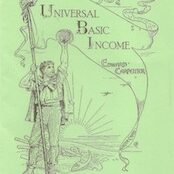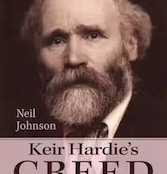On 31 July 1914 the ILP’s Keir Hardie and Arthur Henderson signed an ‘Appeal to the British Working Class’ on behalf of the British section of the International Socialist Bureau, which called for them to ‘act promptly and vigorously in the interests of peace’.
This is what is said:
‘The long threatened European war is now upon us. For more than 100 years no such danger has confronted civilization. It is for you to take full account of the desperate situation, and to act promptly and vigorously in the interests of peace.
‘You have never been consulted about this war.
‘Whatever may be the rights and wrongs of the sudden crushing attack made by the militarist empire of Austria upon Serbia, it is certain that the workers of all countries likely to be drawn into the conflict must strain every nerve to prevent their governments from committing them to war.
‘Everywhere Socialists and the organized forces of Labour are taking this course. Everywhere vehement protests are made against the greed and intrigues of militarists and armament mongers.
‘We call upon you to do the same here in Great Britain upon an even more impressive scale. Hold vast demonstrations against war, in London and in every industrial centre. Compel those of the governing class and their Press, who are eager to commit you to co-operate with Russian despotism, to keep silence and respect the decision of the overwhelming majority of the people, who will have neither part nor lot in such infamy. The success of Russia at the present day would be a curse to the world.
‘There is no time to lose; already, by secret agreements and understandings of which the democracies of the civilized world know only by rumour, steps are being taken which may fling us into the fray. Workers!- stand together , therefore, for peace. Combine, and conquer the militarist enemy and the self-seeking imperialists today and for all.
‘Men and women of Britain, you have now an unexampled opportunity of showing your power, rendering a magnificent service to humanity and to the world. Proclaim that for you the days of plunder and butchery have gone by. Send messages of peace and fraternity to your fellows who have less liberty than you.’
Taken from ‘A Life’s Work’ by Margaret Bondfield, Britain’s first woman cabinet minister who was elected to the ILP’s National Administrative Council in 1913.
The International Socialist Bureau, through Jean Jaurès (France), Hugo Haase (Germany), Emile Vandevelde (Belgium), Ilya Rubanovitch (Russia), Oddino Morgari (Italy) and Keir Hardie (Britain), also issued a declaration in favour of a peaceful settlement of the Serbian question.
—-
See also: ‘First world war bravery was not confined to the soldiers’, a Guardian article by Priyamvada Gopal, printed on 28 February, and Barry Winter’s letter in response.
Other articles about ILPers’ role in resisting World War One are here.



13 September 2015
Sad to say, I don’t agree – Keir Hardie went on after the war started to travel the country urging workers to sign up and join the army. His speech at Merthyr Tydfil was duly reported in the Labour Leader in autumn 1914. What happened to his ‘principles’?
I’m a socialist and proud to be a member of the Socialist Party of Great Britain: this party consistently opposed that war, the 2nd World War, and lots of other wars, from 1914 to the present day.
Wars are never fought in the interests of the working class – whatever the propaganda we don’t have any interests at stake. After all, we don’t end up owning the oilfields and other mineral resources. (These are the usual bones of contention in modern wars.)
The so-called ‘national interest’ is always a cover for the interests of sections of the capitalist class – that’s obvious when this is used at times when workers are on strike, less obvious but just as true when it comes to wars.
30 August 2014
[…] 31 July 1914, Labour leaders Keir Hardie and Arthur Henderson issued their Appeal to the British Working Class. The parties to conflict may change but the principles remain as true today as they did then: […]
23 March 2014
Does anyone know where i can find Keir Hardie’s speech when he opened the ILP centre in Bermondsey. July 8 1911. I would be glad of any links.
Thanks
Alison
13 March 2014
There’s a good piece (and a load of other material) on the Peace Pledge Union website, including this on Fenner Brockway’s actions against the war:
http://www.ppu.org.uk/people/fenner.html
Does anyone happen to have the August 6 1914 front page of Labour Leader mentioned in this article?
Best wishes
Will
7 March 2014
Concerning Labour in the First World War, in John Turner’s ‘British Politics and the Great War’, he states “The anti-war minority was led by Ramsay MacDonald, who was forced to resign as chairman of the party. It included most of the ILP members [MPs I assume HB] and it was a source of leadership for the pacifist Union of Democratic Control.” He qualifies this in a footnote, with a reference to Martin Ceadel’s ‘Pacifism in Britain’, saying “More accurately pasificist…The UDC did not take an absolute stand against the war at all”. On the final point he refers to Robbins’ ‘Abolition of War’.
What happened to the rank and file of the ILP during the war? Was there a significant spilt? Jack Lawson, for instance signed up to fight in France, yet he remained in the ILP and fought the 1918 election, but in opposition to reparations. As the war dragged on some of the divisions in the Labour movement between pro- and anti-war elements began to become less significant. The losses and conditions on the western front became clearer, conscription and directions of labour on the home front became unpopular, there were moves by some to seek a settlement to the conflict; then pro- and anti-war elements of the Labour movement worked together throughout the war on the War Emergency Workers’ National Committee reaching common approaches about the problems faced by the working class. In the General Election just a month after the end of the war, Labour’s vote trebled in percentage terms from the previous election in 1910, despite the Coalition Government’s fix of a coupon election.
If the election had been held just a few month’s later, then Labour would seemingly have done much better as revealed by Labour taking a County Council for the first time in Durham. Within only five years of the 1918 election, there was a General Election result which led to the anti-war Ramsay MacDonald becoming Prime Minister. The strength of the ILP was seemingly eroded more by the 1918 Labour Party rule changes, which established individual membership, than by its past anti-war stance.